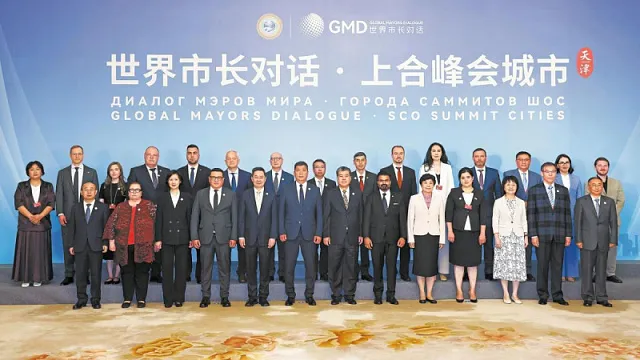The Shanghai Cooperation Organization (SCO) 2025 summit’s Global Mayor’s Dialogue is being held in China’s Tianjin city on Tuesday, July 15. The member countries are discussing steps on how to strengthen the alliance and ink new trade deals and policies. China is leading the summit with talks about making the bloc more efficient and improving the functioning of the alliance. India’s Foreign Minister S. Jaishankar met Chinese President Xi Jinping five years after the border standoff.
Also Read: These 3 Things That May Accelerate The De-Dollarization Move
SCO Countries Plan To Launch Digital Trading Platform & Sideline US Dollar: 2025 Summit

During the SCO 2025 Summit, China discussed the prospects of establishing a new digital trading platform among member nations. The move is to bypass the US dollar for transactions and use the digital trading platform to strengthen the alliance. “We also hope to establish a convenient digital trade platform with SCO member cities to engage in commercial logistics cooperation and supply chain collaboration,” said Wang Xu, Vice Mayor of Tianjin.
The development is still at its nascent stage and needs the nod of the member nations. SCO is also a consensus-based bloc and needs the approval of member countries at the 2025 summit. The forum topics also revolved around transport, urban infrastructure, technology, investment, cultural ties, and green development.
Also Read: More Nations Abandon US Dollar, Egypt PM Confirms Trend
Wang Xu explained that the SCO countries have launched trade routes to Tashkent, Minsk, and other cities to actively develop e-commerce and digital trade. “We are discussing projects in transport, technology, and tourism; many of them are now under the SCO framework. SCO (2025 summit) has become the world’s largest transregional organization, influencing politics, economics, and culture far beyond Eurasia,” he said.
The SCO is an alliance of 10 countries and all the leaders and foreign ministers attended the 2025 summit. The 10 member countries include China, Kazakhstan, Kyrgyzstan, Russia, Tajikistan, Uzbekistan, India, Pakistan, Iran, and Belarus. It also includes observer nations such as Mongolia and Afghanistan.






